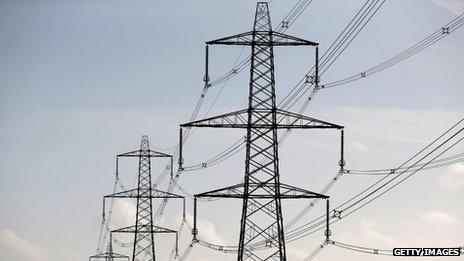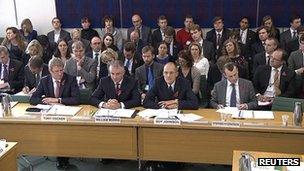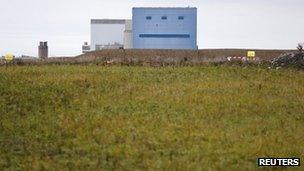Is the energy market structurally flawed?
- Published
- comments

So what would be the point of an investigation of the energy industry by the Competition Commission, which is what Tony Cocker, the chief executive of the UK arm of German giant Eon, called for on Tuesday?
Mr Cocker is not a lone voice in the industry. The boss of another foreign-owned big player in our market, Vincent de Rivaz of EDF, has for a couple of years been asking for the same thing - although Mr Cocker has gone a bit further than Mr de Rivaz by writing to the prime minister, the Energy Minister Ed Davey and the energy regulator, Ofgem, to formally request such a probe.
For both Cocker and de Rivaz, the ostensible motive is that such an independent and detailed investigation is a necessary pre-condition of winning back the trust and confidence of customers and the political class - whom they acknowledge have been completely alienated over the past few years by price rises that have wrecked British people's living standards and are rarely understood.
But, for the avoidance of doubt, this is not a cheap public relations stunt. Once an investigation is launched - and I am told that the prime minister is very close to initiating one - a cloud of expensive uncertainty will descend on the industry. (And, by the way, on Wednesday morning Mr Davey's department put out something of a non-committal response.)
Mr de Rivaz has told me that his company - and by implication his industry - has "nothing to hide", which is why he thinks an inquiry would be a good thing.
But that is only partly relevant. Even if the companies are not colluding to rig prices or deliberately exploiting excessive market power to fatten profits in an unfair way - and they insist they are not - any Competition Commission inquiry would have to examine whether there are structural flaws in the industry which mean that competition does not serve consumers' interests adequately.
That is why such a review is supported, external by one of the more influential voices on competition in the UK, the former head of the Office of Fair Trading, John Fingleton.
And because such a review would be so serious, the companies would find it more expensive to raise money for investment - their cost of capital would increase - until it became clear whether the Competition Commission would force radical change on the industry, such as breaking up the big six players.
The big question that any Competition Commission probe would have to answer is whether it is good or bad for consumers, and for the British economy, that energy companies are allowed both to generate power and sell it to us.

Energy bosses were questioned by MPs
Does this vertical integration allow the energy giants to invest for the long term, confident they have a captive market, thus making sure that the UK has ample supplies of relatively cheap energy over the longer term?
This is what Mr de Rivaz would claim, citing the example of France, whose massive investments in nuclear power over decades by vast and integrated EDF has led to French people enjoying cheaper power than the British and some of the cheapest electricity in Europe.
Or does this combination of so-called upstream and downstream activities set up a conflict of interest to the detriment of customers - in that integrated companies have less of an incentive to keep retail prices as low as possible, since higher prices boost the profits of their generators and the value of whatever gas reserves they hold?
There is a related issue of whether the current regulator, Ofgem, is fit for purpose.
Any referral of the industry to the Competition Commission would probably be in a slap in the face for Ofgem, since it has argued that the industry suffers from behavioural rather than structural weakness. And it is trying to secure a better deal for consumers by forcing the big companies to be open and more transparent about their charges and profitability.

The site of EDF's new nuclear plant at Hinkley Point
The concern in government and at Ofgem about a Competition Commission investigation is that it would be a further deterrent to investment in new generating capacity, at a time when the UK is perilously close to seeing the lights go out because so much old plant is being decommissioned.
That said, some argue that the game is up anyway till after the election - in that (with the exception of the recent Hinkley Point C nuclear deal, which will take many years to build and had cross party support) the party conference statement of Ed Miliband that as prime minister he would freeze prices may be leading to an investment hiatus in any case.
What is striking is the dog that hasn't barked: the debate is largely about how competition can be improved. But none of the big parties is arguing that the UK should more closely follow the French model and revert to greater direction and state ownership of the industry.
And perhaps that is why Cocker and de Rivaz favour a Competition Commission probe - to ward off the more serious threat to them of a return to explicit government control.